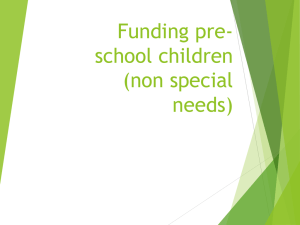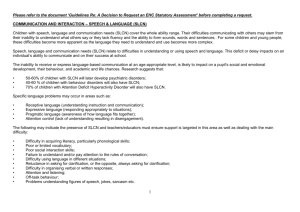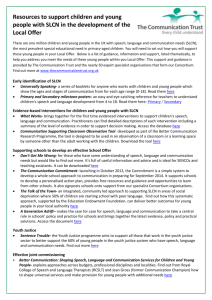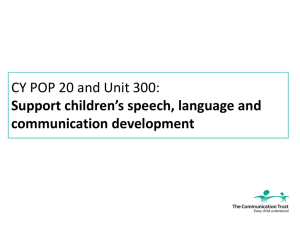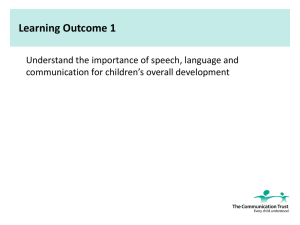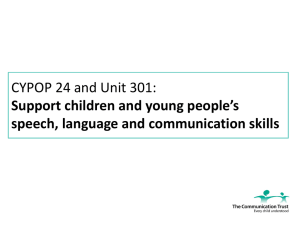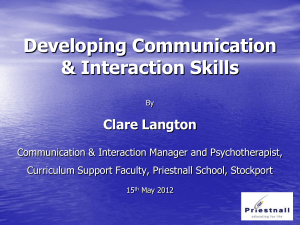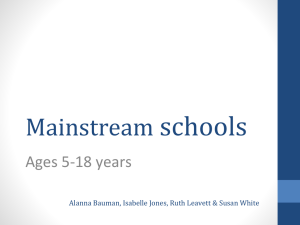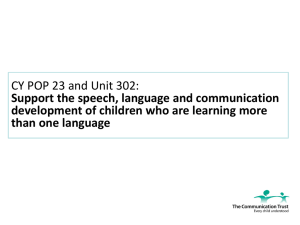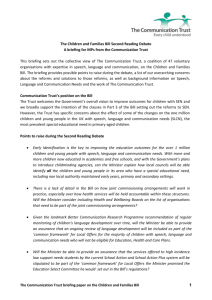Freda O`Driscoll
advertisement
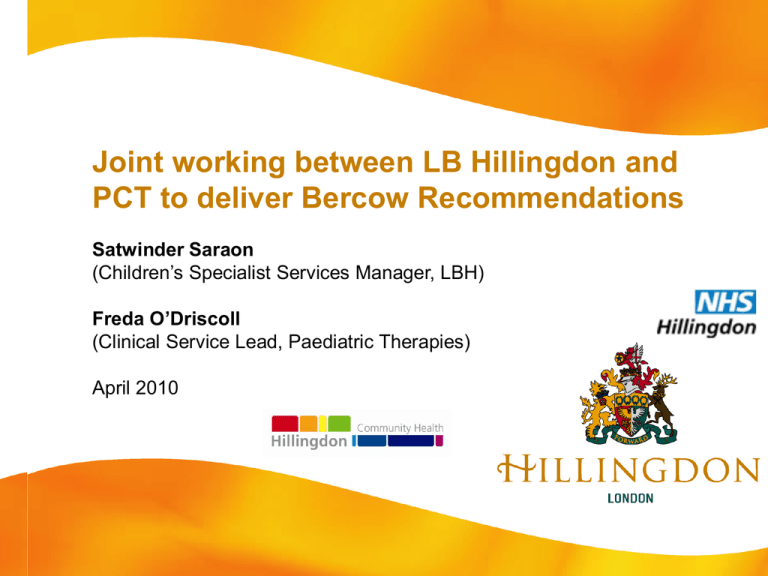
Joint working between LB Hillingdon and PCT to deliver Bercow Recommendations Satwinder Saraon (Children’s Specialist Services Manager, LBH) Freda O’Driscoll (Clinical Service Lead, Paediatric Therapies) April 2010 BERCOW REVIEW • A National centrally commissioned review of provision for children and young people with SLCN • 40 Bercow Recommendations: To improve provision for children and young people with SLCN. To improve understanding of the importance of communication Bercow Driver for Change • To ensure that early identification and interaction are recognised as essential • Over arching understanding that no single agency can deliver the 5 ECM outcomes in isolation. Aim: To jointly plan, commission, and deliver universal, targeted and specialist services Bercow Recommendations • Development of a Joint Commissioning Framework • SLCN Steering group • Operational group established Recommendations cont’d • Robust system for early identification • Early screening and intervention for SLCN • Clear pathways to be agreed • Health Promotion/ Prevention • Training • Monthly triage assessment Recommendations cont’d • Monitoring at Key Transition Points between LA & PCT • Year 7 school transition groups for Children with SLCN • Speech / Language link • Transition information Secondary Schools Recommendations cont’d • 0-5 years monitoring by PCT through “Child Health Promotion Programme” • Leaflets / parent information packs • Universal Health questionnaires • 8 months and 2 years • ECAT- Every Child A Talker Recommendations cont’d • Range of information, advice and support should be readily available to families. • Preschool and school age information packs and resources • Training of HV Teams to support parent information/advice • Speech and Language Link resources and information • Joined up working between schools, Health and Education across universal, targeted and specialist support • Information available through Children’s Information Services (early years) Recommendations cont’d • SLCN – identified and prioritised by all Children’s Centres. • New Commissioning opportunities • Wellcomm • Monthly drop-in triage assessment session • Training for Children’s Centres Recommendations cont’d Workforce development • Range of training for a range of professionals to be developed. • SCLN workstream mapping current training provision and identifying gaps/ current and future needs/ tracking impact. • Supporting SpeechLink / Wellcomm Tools • Training Teaching Assistants • Training for Foundation Staff (KS1) • ELKLAN – Link highly skilled TAs. SLT and LAS; Mainstream Schools Integrated Model For Joint Working Wave 1 – Universal w Embed Screening Tool ( SpeechLink and LanguageLink) w Provide Parental Information wAdvising on Language Group work in schools wInclusion Development Plan (IDP Team, SO’B) w Provision planning in schools w Language enrichment and the curriculum w Vocabulary Project – Secondary Pilot w Joint planning – general SLCN in schools w Training including IDP team Wave 2 – Targeted w Joint planning – caseload / input / support w Language groups – advice, support and monitoring (Amber children w Amber children – speech, dysfluency etc. w Targeted training w Advice for Teaching Assistants w Curriculum Differentiation w ELKLAN Training – Class Teachers & Teaching Assistants Led by Speech and Language Therapy (SALT) Led by Language Advisory Team May be provided by SALT and / or Language Advisory Team (Joint planning and discussion) Further support from/ linking with IDP team Wave 3 – Specialist w Social communication w Severe Language Disorders w Severe Speech Disorders w AAC Needs w Physical Disabilities w Hearing Impairment w Selective Mutes w Severe Dysfluencies / Stammering w Complex medical conditions (Acquired Brain Injury [ABI], Cleft Palate, Down’s Syndrome) Identification Early Intervention – SpeechLink/ Language Link The package • Computer based speech screen for developmental speech difficulties (recommended age for use 4-8 years) • Web site with detailed information and resources on supporting children with speech difficulties • To be administered by teacher or teaching assistant who can then directly access and implement speech sound programmes based on individual child’s profile. The screen • For children aged 4-8 years • Language Link screen for all children on reception entry. • Speech Link screened for any child with “immature Speech” • Looks at the ability to produce sounds at the beginning and end of words • Both screens takes 15 minutes each to administer by TA’s or Teachers Speech Link Website • Speech development information • Handouts for parents • Full range of speech programmes • Printable picture resources • Demonstration video • Computer based speech games Language Link Website • Language development • Language difficulties explained • Encouraging spoken language • General classroom strategies • Handouts for parents • Range of language programmes for school implementation • Printable picture resources Next Steps • 49 Schools currently signed up to the training • Training programme June/September • Screening starts in September for language for all Reception aged children • January- Screening for speech • Continuing Operational Group work streams to deliver on Bercow priorities
